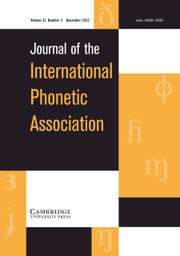Article contents
Duration of epenthetic [t] in polysyllabic American English words
Published online by Cambridge University Press: 06 February 2004
Abstract
This paper reports how stress and the position of the /ns/ cluster in polysyllabic words affect [t] epenthesis in four different environments: (1) word-medial after a stressed vowel (e.g. 'cen.sus vs. 'dentsus); (2) word-final after a stressed vowel (e.g. in.'tense vs. in'tents); (3) word-medial after a stressless vowel (e.g. con.'sent vs. blunt 'say.ing); and (4) word-final after a stressless vowel (e.g. 'sci.ence vs. 'con.tents). Analysis of stop closure durations in experimental sentences read by seven American English speakers reveals that position, not stress, is the most important factor in [t] epenthesis: final position (e.g. science and intense) favors epenthesis. Stress is found to have an effect on stop closure durations in the way it interacted with word-position – i.e. for the final /ns/ cluster, stress immediately before it disfavors epenthesis (e.g. intense). The underlying /t/ is shown to be not significantly longer than the epenthetic [t]. Measurements from polysyllabic words in the TIMIT corpus corroborate the experimental results that word-final position favors epenthesis and that stress does not correlate with epenthesis. In the TIMIT data, however, underlying /t/ was significantly longer than epenthetic [t].
- Type
- Articles
- Information
- Journal of the International Phonetic Association , Volume 33 , Issue 2 , December 2003 , pp. 153 - 164
- Copyright
- Journal of the International Phonetic Association 2003
- 12
- Cited by




